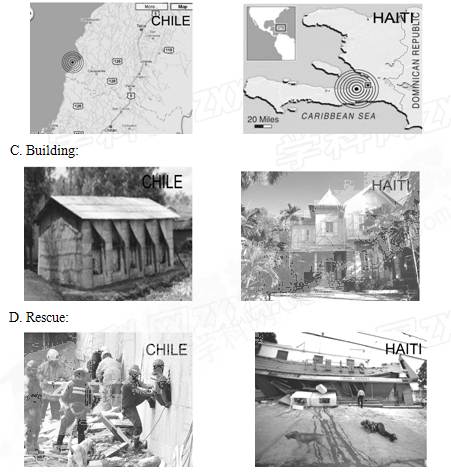Two Earthquakes in Two Months:
Comparing the Quakes in Haiti (海地) and Chile (智利)
Overview (概要) How do the earthquakes in Chile and Haiti compare? Here, students perform a gallery walk to learn more about the earthquakes from a specific point, and then do a specific research and presentation project or response activity. Finally, they seek answers to their unanswered questions.
Materials Print copies of photographs, charts, documents and other visuals to display, as described below; computer (s) with Internet access (optional), research materials, handouts.
Warm-up Choose and prepare a “gallery” of photographs, graphics, news reports and other materials to display around the room to enable students to consider the 2010 earthquake in Chile.
Depending on course program, choose materials for the gallery that provide a window on the two quakes, through one of the following specific points, or the focus of your choice:
Earthquakes through History Putting the 2010 Chilean and Haitian quakes into historical view related to other earthquakes, including the 1960 Chilean quake and the 2004 Asian earthquake and tsunami.
Rescue and Aid Considering domestic and international response to the disasters by militaries, governments and aid organizations, including rescue and recovery as well as efforts to provide food, water, health care and shelter to those affected.
Related The article Underwater Plate Cuts 400 Mile Gash compares several earthquakes:
Mr. Lin figured that the quake on Saturday was 250 to 350 times more powerful than the Haitian quake.
But Paul Caruso noted that at least on land, the effects of the Chilean tremor (震动) might not be as bad. For one thing, he said, the quality of building construction is generally better in Chile than in Haiti. And the fact that the quake occurred offshore should also help limit the destruction. In Haiti, the rupture (断裂) occurred only a few miles from the capital, Port-au-Prince. The rupture on Saturday was centered about 60 miles from the nearest town, Chillan, and 70 miles from the country’s second-largest city, Concepción.
Read the article using the following questions.
Questions For discussion with others and reading comprehension:
How does the 2010 Chilean earthquake compare to the 1960 Chilean earthquake?
Why do scientists believe that the 2010 Chilean earthquake will not cause the same level of damage as January’s Haitian earthquake did?
How does the 2010 Chilean earthquake compare to the 2004 Indonesian earthquake?
What reasons do scientists give to explain why the Indonesian quake caused so much more damage than the recent Chilean earthquake?
64. Which of the following shows one of the reasons for slighter losses in Chile than in Haiti?
A. Position:

B. Power:

65. We can infer that the article Underwater Plate Cuts 400 Mile Gash includes ________.
A. the causes of the 2010 Chilean earthquake and the 1960 Chilean earthquake
B. the comparison between the 2010 Haitian and the 2004 Indonesian earthquakes
C. the reason for the 2010 Chilean quake being more powerful than January’s Haitian earthquake
D. the reason for less damage in the 2010 Chilean quake than in the 2004 Indonesian earthquake
66. What is the passage most likely to be?
A. A program for research. B. A guide to earthquake study.
C. An advertisement for students. D. An introduction to quakes.

 名校课堂系列答案
名校课堂系列答案
